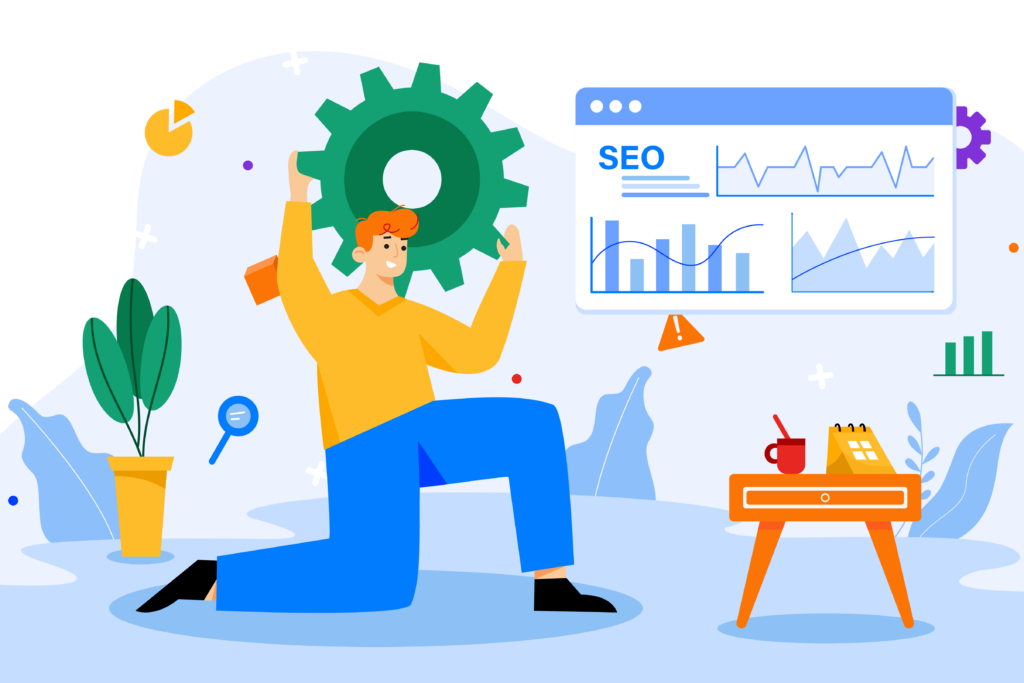Choosing the best SEO ecommerce platform is the critical first step to unlocking your online store’s full potential. In today’s digital marketplace, visibility is everything—without effective SEO, even the most stunning ecommerce site remains hidden in the shadows. SEO is more than just a buzzword; it’s the backbone of your online presence, driving organic traffic, boosting sales, and creating lasting customer relationships.
From on-page tweaks to technical enhancements, the right platform can make or break your SEO strategy. Whether you’re a budding entrepreneur or a seasoned retailer, selecting the ideal ecommerce platform tailored for SEO is paramount to achieving sustainable growth and dominance in your niche.
- Understanding SEO for Ecommerce
- Essential SEO Features in Ecommerce Platforms
- In-Depth Comparison of Top Ecommerce Platforms
- Advanced SEO Features and Tools
- Cost-Benefit Analysis
- Choosing the Right Platform for Your Business
- Discover Your Path to Ecommerce Success with the Right SEO Platform
- FAQs
- What factors should I consider when choosing an SEO-friendly ecommerce platform?
- Which ecommerce platform offers the best SEO plugins and apps?
- How does site speed affect SEO for ecommerce platforms?
- Is it necessary to have SSL and security features in an ecommerce platform for SEO?
- What are the hidden costs to consider when choosing an SEO ecommerce platform?
Understanding SEO for Ecommerce
In the competitive world of ecommerce, understanding the nuances of SEO is essential. It’s not just about ranking high on search engines; it’s about driving the right traffic to your store and converting visitors into loyal customers.
Basics of SEO
- On-Page SEO: Focuses on optimizing individual pages for specific keywords. This includes meta tags, headers, and content quality.
- Off-Page SEO: Involves building backlinks and improving your site’s authority through external sources.
Technical SEO: Ensures your website meets the technical requirements of search engines. This includes site speed, mobile-friendliness, and proper indexing.

How SEO Differs for Ecommerce Sites
- Product Pages: Each product page must be optimized for unique keywords.
- User Experience: Navigation, site structure, and ease of use directly impact SEO.
- Rich Snippets: Utilizing schema markup to enhance search results with product information.
Key SEO Metrics to Track
- Organic Traffic: The number of visitors coming from search engines.
- Conversion Rate: The percentage of visitors who make a purchase.
- Bounce Rate: The percentage of visitors who leave after viewing only one page.
- Average Session Duration: How long visitors stay on your site.
Understanding these facets of SEO tailored for ecommerce will set the foundation for choosing the best platform to elevate your online business.
Essential SEO Features in Ecommerce Platforms
Selecting the right ecommerce platform goes beyond aesthetics and functionality; it must come equipped with robust SEO features to ensure your online store thrives. Here are the essential SEO features to look for:
Mobile Responsiveness
- Mobile-First Indexing: Google prioritizes mobile-friendly sites, making responsiveness crucial.
Site Speed and Performance
- Fast Loading Times: A slow site can lead to high bounce rates and lower rankings.
URL Structure Customization
- SEO-Friendly URLs: Clean, descriptive URLs improve user experience and search engine indexing.
Meta Tags and Descriptions
- Optimized Metadata: Customizable meta titles and descriptions help target specific keywords.
Schema Markup and Rich Snippets
- Enhanced Search Results: Utilize schema to display product details directly in search results.
Integrated Blogging Capabilities
- Content Marketing: Regularly updated blogs can boost SEO and drive traffic.
SSL and Security Features
- Secure Browsing: HTTPS is a ranking factor and builds customer trust.
User-Friendly Navigation
- Easy-to-Use Menus: Simplified navigation improves user experience and SEO.
Ensuring your ecommerce platform offers these features will set the stage for a successful SEO strategy and a thriving online store.

In-Depth Comparison of Top Ecommerce Platforms
Choosing the right ecommerce platform tailored to your SEO needs is crucial for online success. Each platform offers unique strengths and weaknesses in optimizing for search engines. Below is a comparative overview of SEO aspects and best practices for some of the leading ecommerce platforms:
| Ecommerce Platform | SEO Strengths | SEO Weaknesses | Best Practices for Optimization |
| Shopify | – User-friendly interface for SEO novices | – Limited control over technical SEO aspects | – Use SEO apps like Yoast Shopify for optimization |
| – Excellent speed and mobile optimization | – Relatively higher cost compared to others | – Customize meta tags and optimize product descriptions | |
| WooCommerce | – Full control over SEO settings and customization | – Requires more technical knowledge for setup | – Utilize SEO plugins like Yoast WooCommerce |
| – Flexible and scalable for SEO strategies | – Hosting and maintenance responsibilities | – Optimize categories, tags, and product URLs | |
| Magento | – Powerful and customizable for SEO professionals | – Steeper learning curve and resource-intensive | – Implement AMP for faster mobile load times |
| – High level of control over technical SEO | – Higher initial setup and maintenance costs | – Optimize images and use structured data | |
| BigCommerce | – Built-in SEO features and easy integration | – Limited scalability for larger stores | – Optimize for mobile with responsive design |
| – Good performance and security features | – Limited theme customization options | – Use SEO-friendly URLs and optimize for site speed | |
| Wix | – Intuitive SEO tools and simple setup | – Limited customization for advanced SEO | – Utilize Wix SEO Wiz for automated optimization |
| – Automatic SEO improvements | – Less control over technical SEO settings | – Focus on content quality and use structured data |
Choosing the best platform depends on your business goals, technical expertise, and budget. Each platform offers unique features that can enhance your ecommerce SEO strategy and drive organic traffic to your online store.
Advanced SEO Features and Tools
To stay ahead in the competitive ecommerce landscape, leveraging advanced SEO features and tools is essential. These tools not only streamline your optimization efforts but also provide valuable insights into your website’s performance and user behavior.
Integration with Google Analytics and Search Console
- Data-driven Insights: Monitor traffic trends, user demographics, and behavior to refine your SEO strategy.
- Performance Tracking: Measure keyword rankings, traffic sources, and conversion rates for informed decision-making.
Use of SEO Plugins and Apps
- Enhanced Functionality: Plugins like Yoast and All in One SEO simplify on-page optimization.
- SEO Recommendations: Receive actionable suggestions to improve content readability, meta tags, and internal linking.
Automated SEO Tools
- Efficiency: Automate routine tasks such as sitemap generation and broken link detection.
- Time Savings: Focus on strategic SEO efforts while tools handle repetitive tasks.
Built-in SEO Auditing Tools
- Diagnostic Capabilities: Identify and rectify SEO issues like duplicate content and crawl errors.
- Continuous Improvement: Regular audits ensure your site meets search engine guidelines and maintains peak performance.
Integrating these advanced SEO features into your ecommerce platform empowers you to optimize effectively, improve visibility, and drive sustainable growth in organic traffic and conversions.

Cost-Benefit Analysis
When selecting an ecommerce platform, considering the financial implications alongside SEO benefits is crucial for long-term success and profitability.
Pricing of Platforms and SEO Features
- Initial Costs: Compare setup fees, monthly subscriptions, and transaction fees.
- SEO Feature Costs: Evaluate additional costs for premium SEO plugins and tools.
Long-Term Value and ROI
- Scalability: Assess how well the platform scales with your business growth.
- SEO Impact: Measure potential ROI through increased organic traffic and conversion rates.
Hidden Costs to Consider
- Plugins and Themes: Factor in costs for premium plugins, custom themes, and ongoing updates.
- Developer Fees: Budget for technical support, customization, and maintenance costs.
Conducting a thorough cost-benefit analysis helps align your platform choice with your budget and business objectives, ensuring you maximize ROI while optimizing for SEO performance.
Choosing the Right Platform for Your Business
Selecting the ideal ecommerce platform involves assessing various factors beyond SEO capabilities to ensure alignment with your business goals and future growth.
Evaluating Your Business Needs
- Product Range: Consider the type and volume of products you plan to sell.
- Target Audience: Understand your audience demographics and shopping behavior.
- Sales Channels: Determine if you’ll sell exclusively online or through multiple channels.
Customizability vs. Out-of-the-Box Solutions
- Customization Flexibility: Assess how much control you need over design and functionality.
- Ease of Setup: Compare the complexity of setup and maintenance for custom vs. out-of-the-box solutions.
Scalability and Growth Potential
- Future Expansion: Evaluate how well the platform supports business growth and increased traffic.
- Integration Capabilities: Check compatibility with third-party tools and future integrations.
Customer Support and Community
- Support Quality: Look for responsive support options and resources for troubleshooting.
- Community Engagement: Join forums or communities to gauge user experiences and support network.
By aligning these considerations with your specific business needs, you can confidently choose an ecommerce platform that not only enhances SEO performance but also supports sustainable growth and customer satisfaction.
Discover Your Path to Ecommerce Success with the Right SEO Platform
Choosing the best SEO ecommerce platform is pivotal to your online success. At Flying V Group, we specialize in guiding businesses like yours through this crucial decision-making process. Our team combines expert knowledge with proven strategies to optimize your ecommerce site for maximum visibility and profitability. Whether you’re navigating the complexities of Shopify, WooCommerce, Magento, BigCommerce, or Wix, we provide tailored solutions that align with your unique business goals.
Trust Flying V Group to elevate your online presence and position you as a leader in your industry. Contact us today to discover how we can help you find and implement the best SEO ecommerce platform for your business.
FAQs
What factors should I consider when choosing an SEO-friendly ecommerce platform?
Focus on mobile responsiveness, site speed, customizable URL structures, built-in SEO features, and integration capabilities with SEO tools like Google Analytics.
Which ecommerce platform offers the best SEO plugins and apps?
WooCommerce and Shopify are known for robust SEO plugins like Yoast and All in One SEO, offering comprehensive on-page optimization and user-friendly interfaces.
How does site speed affect SEO for ecommerce platforms?
Faster loading times improve user experience, reduce bounce rates, and contribute positively to search engine rankings, enhancing overall SEO performance.
Is it necessary to have SSL and security features in an ecommerce platform for SEO?
Yes, SSL ensures secure browsing, boosts trust with customers, and is a ranking factor for search engines, making it essential for SEO success.
What are the hidden costs to consider when choosing an SEO ecommerce platform?
Beyond initial setup and subscription fees, budget for costs related to premium plugins, custom themes, ongoing maintenance, and potential developer fees.






0 Comments